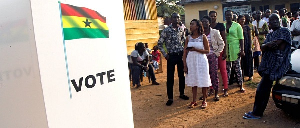The 2024 elections unveiled a striking chapter in our democratic history that demands vigilance and reflection from every Ghanaian. With the rise of the internet, smartphones, and social media, political campaigns have taken unpredictable twists, reshaping the narrative of our time.
The National Democratic Congress (NDC) emerged victorious with a margin exceeding 1.6 million votes and a commanding two-thirds majority in Parliament.
This outcome not only rewrites history but also reshapes the future of governance in Ghana. While this overwhelming mandate signals a potential to reset the nation’s direction, it also raises questions of profound national importance.
What does this unprecedented win mean for Ghana's democracy, the NDC, and the opposition New Patriotic Party (NPP)? It is a pivotal moment for our political ecosystem—a test of governance that demands responsibility, caution, and restraint.
The NDC’s supermajority in Parliament grants them significant authority, but it comes with immense responsibility. This is a moment to protect, not erode, our democracy. Any attempt to misuse this majority to amend laws, replace the Chief Justice, or compromise the judiciary would strike at the heart of the democratic values Ghanaians hold dear.
The mandate handed to the NDC was not a blank check for impunity, but a call to rebuild and reset a struggling nation. Let the NDC remember: Ghanaians will not sit idly by and tolerate the abuse of power. Suppose the President-elect, John Dramani Mahama, and his party lose sight of the people’s trust by prioritizing partisan gains over national progress.
In that case, they risk unleashing a wave of discontent that could define their legacy in infamy.
The pressure on the NDC to satisfy their grassroots supporters presents a real governance challenge. This is not a time for indulgence in factional politics. Governing with a two-thirds majority requires balancing party expectations and the national interest. Prioritizing partisan satisfaction over economic and social stability risks plunging Ghana into more profound disarray.
The NDC must resist the temptation to succumb to internal pressures at the expense of the broader good. Ghana’s constitution was designed to withstand such tests of power and character, and the party must act as stewards of this responsibility, not opportunists exploiting it for short-term gains.
During the campaign, Mahama declared, “It’s about the economy,” borrowing a phrase from an American president. Ghanaians believed this message and handed him and the NDC the reins of power. The economy must remain the central focus—not legislative overreach or constitutional experiments.
The livelihood of ordinary Ghanaians depends on the government’s ability to tackle inflation, create jobs, and ensure stability. The NDC must understand that failure to address the people's economic needs will not be forgiven. With the reach of social media and the internet, citizens are more informed and vocal than ever. Attempts to sidestep this priority will be met with scrutiny and resistance.
This moment is not just a test for the NDC or Mahama, but for all Ghanaians. We must stand vigilant, ready to hold our leaders accountable and defend the integrity of our democracy.
The power of the people is more potent than any parliamentary majority, and our voices must remain steadfast against impunity or mismanagement. As a nation, we must demand that the NDC’s historic mandate be used to advance Ghana’s collective interests. The eyes of the country—and the world—are watching.
This is a time for unity, resilience, and a commitment to the principles that have guided us thus far. Let us not falter in this critical moment. Let us remind our leaders that their power is not absolute—the people entrust it, and it must be wielded with care and humility.
Opinions of Wednesday, 11 December 2024
Columnist: Isaac Ofori















